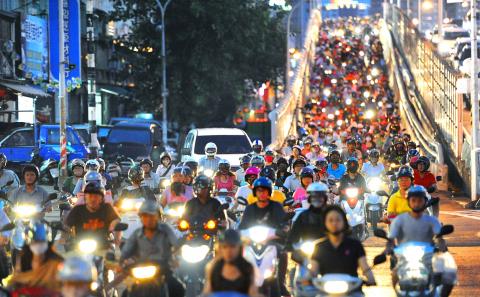More than 60 percent of Greater Kaohsiung residents use scooters, putting scooter use in the city not only higher than the national average, but also at the top of the list among the five special municipalities.
According to the latest statistics from the Directorate-General of Budget, Accounting and Statistics (DGBAS), nationwide scooter usage last year stood at 48.5 perrcent, but 61.9 percent of Greater Kaohsiung’s residents use scooters, ranking it the municipality with the highest scooter usage of all five special municipalities. It also means Kaohsiung is the only city where more than 60 percent of city’s population use scooters.
The DGBAS said the numbers were connected to the high density of scooters within Greater Kaohsiung, with 830 scooters for every 1,000 people. Greater Tainan comes in at second place with 775 scooters per 1,000 people. In Taipei, there are 415 scooters per 1,000 people, DGBAS statistics showed.

Photo: Chang Chung-yi, Taipei Times
DGBAS data show that Greater Kaohsiung broke the 750 scooter level in 2007 and went on to break the 800 mark in 2009.
The Ministry of Transportation and Communications suspects that, aside from a lack of public transportation in southern cities and counties contributing to the massive scooter proliferation rate, more sunny weather also plays a role.
The ministry also says that because the average income in southern Taiwan is lower than that of Taipei, riding a scooter is more cost-efficient than driving a car or using public transport.
Despite the efforts of the Greater Kaohsiung Government to promote public transportation, figures for public transportation use in the city stand at only 6.6 percent — only slightly higher than Greater Tainan’s 4.9 percent — and the city ranked fourth out of the five special municipalities.
However, the DGBAS data suggested that while Kaohsiung’s public transport usage figures were dismal, it was a slight increase compared with 2010 and this showed that the city government’s efforts are finally beginning to pay off.
Meanwhile, the data showed that 1,113 parking lots were taken up for every thousand cars in Greater Kaohsiung, meaning the city’s automobile usage rate is less than half that of Taipei and New Taipei City (新北市).
Greater Kaohsiung councilors have also made the high proliferation of scooters in the city one of their top priorities and in the first half of the year asked for the government to suggest proposals on how to reduce the number of scooters in the city.
Some city councilors have even suggested that the city government take a page from China’s book and stop authorizing scooter licenses on a general basis.
With an excess of scooter traffic comes the problem of illegal parking and in an effort to curb the practice the government has begun to set up scooter parking areas in traffic-heavy neighborhoods, such as Rueifung Night Market, Kaohsiung Train Station and the Shiinkuchan Commercial Zone (新崛江商圈).
The Greater Kaohsiung Government said it charges a standard fee for each scooter entering a parking area and so far scooter riders have accepted the charge. It added that it is asking its police force to step up efforts at handing out fines along with other punitive measures for illegal parking.

Alain Robert, known as the "French Spider-Man," praised Alex Honnold as exceptionally well-prepared after the US climber completed a free solo ascent of Taipei 101 yesterday. Robert said Honnold's ascent of the 508m-tall skyscraper in just more than one-and-a-half hours without using safety ropes or equipment was a remarkable achievement. "This is my life," he said in an interview conducted in French, adding that he liked the feeling of being "on the edge of danger." The 63-year-old Frenchman climbed Taipei 101 using ropes in December 2004, taking about four hours to reach the top. On a one-to-10 scale of difficulty, Robert said Taipei 101

Nipah virus infection is to be officially listed as a category 5 notifiable infectious disease in Taiwan in March, while clinical treatment guidelines are being formulated, the Centers for Disease Control (CDC) said yesterday. With Nipah infections being reported in other countries and considering its relatively high fatality rate, the centers on Jan. 16 announced that it would be listed as a notifiable infectious disease to bolster the nation’s systematic early warning system and increase public awareness, the CDC said. Bangladesh reported four fatal cases last year in separate districts, with three linked to raw date palm sap consumption, CDC Epidemic Intelligence

Two Taiwanese prosecutors were questioned by Chinese security personnel at their hotel during a trip to China’s Henan Province this month, the Mainland Affairs Council (MAC) said yesterday. The officers had personal information on the prosecutors, including “when they were assigned to their posts, their work locations and job titles,” MAC Deputy Minister and spokesman Liang Wen-chieh (梁文傑) said. On top of asking about their agencies and positions, the officers also questioned the prosecutors about the Cross-Strait Joint Crime-Fighting and Judicial Mutual Assistance Agreement, a pact that serves as the framework for Taiwan-China cooperation on combating crime and providing judicial assistance, Liang

US climber Alex Honnold left Taiwan this morning a day after completing a free-solo ascent of Taipei 101, a feat that drew cheers from onlookers and gained widespread international attention. Honnold yesterday scaled the 101-story skyscraper without a rope or safety harness. The climb — the highest urban free-solo ascent ever attempted — took just more than 90 minutes and was streamed live on Netflix. It was covered by major international news outlets including CNN, the New York Times, the Guardian and the Wall Street Journal. As Honnold prepared to leave Taiwan today, he attracted a crowd when he and his wife, Sanni,